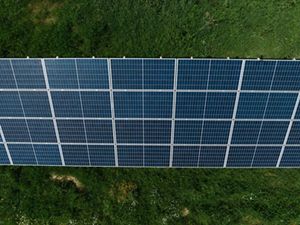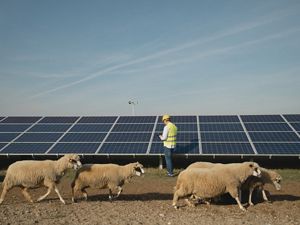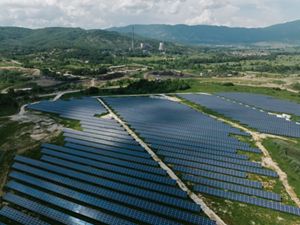Montenegro Takes Significant Step Toward Achieving 50% Renewable Energy Target by 2030
Ministry of Energy, The Nature Conservancy, Eco-team join forces to map ideal renewable energy sites for people and planet
Media Contacts
-
Bridget Nurre Jennions
Marketing and Communications Director
The Nature Conservancy
Email: bridget.jennions@tnc.org
To accelerate its shift to renewable energy and expedite the decarbonization of the energy sector, today, Montenegro has announced the launch of the Montenegro Energy Growth and Acceleration (MEGA) national study. The initiative aims to identify sites with significant energy potential that also pose minimal ecological and social conflicts for developing solar and wind power plants.
The MEGA study will be conducted by The Nature Conservancy (TNC) and Eco-team, in partnership with the Montenegrin Ministry of Energy, which will oversee the study's development and provide institutional backing. The national project will deploy TNC's internationally recognized smart siting methodology, which helps pinpoint areas suitable for solar and wind power installations that do not conflict with significant natural, cultural-historical and socio-economic values, or where such conflicts are minimal.
The project builds on a pilot study conducted in the municipality of Nikšić, which demonstrated that there is enough renewable energy capacity from that municipality alone to power the country's 200,000 households, while having minimal impact on the environment and local communities.
The MEGA study was formally launched today with support from Montenegro’s Investment Agency and Ministry of Energy during the inaugural meeting of the Advisory Committee. The committee includes representatives from key national, regional and international bodies in energy like the Energy Community Secretariat, spatial planning, environmental protection and finance, and will guide the project’s development and help incorporate the study's findings into national policies.
Recognized as a biodiversity hotspot and having the ambitious goal of achieving a 50% share of energy from renewable sources in its gross energy consumption by 2030, Montenegro must prioritize enhancing solar and wind energy capacity while safeguarding natural and social values. Like other countries in the region where TNC and its partners are conducting similar analysis, the MEGA study will enable Montenegro to designate Renewable Acceleration Areas in accordance with the new EU Renewable Energy Directive. The Directive will become applicable to Montenegro after its transposition by the Energy Community, of which Montenegro is a member.
In addition to external experts, professionals from various state institutions and companies will participate in the project implementation, including the Environmental Protection Agency, the Ministry of Spatial Planning, Urbanism and State Property, the Ministry of Agriculture, Forestry and Water Management and the Montenegrin Electricity Transmission System.
“Montenegro is dedicated to its energy and climate objectives, aiming to decrease reliance on fossil fuels. The national study will aid in strategically planning and attaining a diverse, environmentally and economically sustainable electricity generation. This will play a crucial role in reaching our targets for 2050 concerning the nation's contribution to climate neutrality," said Biljana Ivanović, State Secretary in the Ministry of Energy.
“TNC's expertise in smart siting demonstrates that renewable energy development can coexist with nature conservation and the needs of local communities. This methodology aids in identifying areas that support sustainable development and accelerate investments. The potential for generating electricity from solar and wind in Montenegro is substantial. The approach we will employ in developing the MEGA national study will enable us to precisely gauge the potential of renewable energy sources in megawatts and identify the most suitable locations for building power plants without infringing on anyone's rights. I am confident that this is the right path to support Montenegro through the challenging energy transition process,” said Igor Vejnović, Southeast Europe Program Director at The Nature Conservancy.
“For Eco-team, as an organization that closely monitors decarbonization issues in Montenegro's electricity sector, the development of a national study mapping low-conflict locations for solar and wind is of particular importance, especially given the institutional support for the entire process. Recognizing that decarbonization is not only an energy issue but also a social and ecological one, we believe this approach will yield concrete results that help Montenegro decarbonize its energy sector while minimizing impacts on nature and people,” said Milija Čabarkapa, Executive Director of Eco-team.
Eco-team is an organization whose primary mission is the protection of the environment and sustainable use of natural resources through public advocacy activities in the development of public policies, education of the public and private sectors, and involvement of the public in decision-making processes.
The Nature Conservancy is a global conservation organization dedicated to conserving the lands and waters on which all life depends. Guided by science, we create innovative, on-the-ground solutions to our world’s toughest challenges so that nature and people can thrive together. We are tackling climate change, conserving lands, waters and oceans at an unprecedented scale, providing food and water sustainably and helping make cities more sustainable. The Nature Conservancy is working to make a lasting difference around the world in 81 countries and territories (40 by direct conservation impact and 41 through partners) through a collaborative approach that engages local communities, governments, the private sector, and other partners. To learn more, visit nature.org or follow @nature_press on X.



